The UK spends approximately £150 million per year administering elections
Democracy costs money, although it isn’t always clear how much. As part of the evidence for Democratic Audit’s new report on election information, we gathered data from a range of sources to produce a comprehensive estimate of how much UK taxpayers spend administering elections. Richard Berry sets out the findings here.
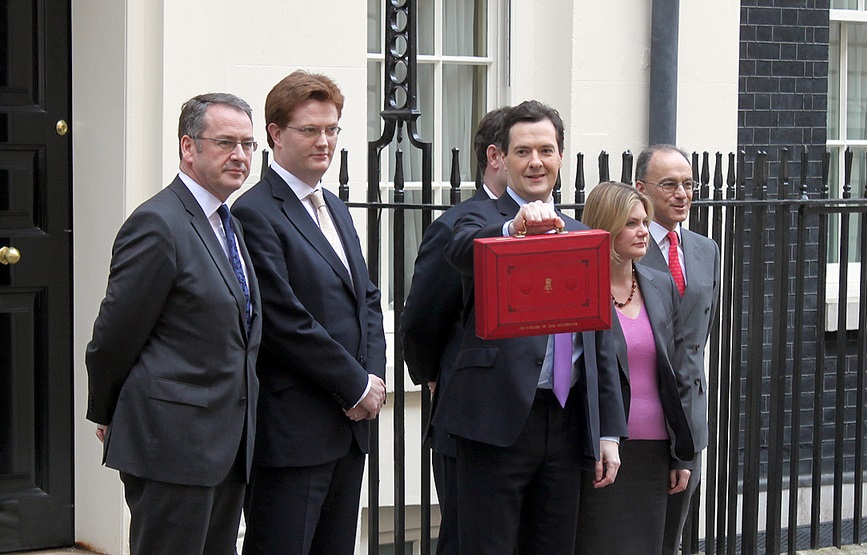
He spends £5.91 on every vote cast. Is it money well spent? Credit: HM Treasury (CC BY-NC-ND 2.0)
The costs of running elections has provided several moments of controversy in recent years. In 2011’s referendum on the Alternative Vote, the allegedly higher cost of the system compared to First Part the Post became a theme of the campaign. In 2012, in the very first Police and Crime Commissioner elections the Home Office provoked criticism when it decided not to allow candidates a free election address, on cost grounds.
We wanted to estimate how much elections cost to administer in the UK. To do so we checked official sources to discover the cost of each major election held over the previous five year (2009-2013) period, as well as the running costs of the Electoral Commission and the various boundary commissions. Our estimate includes only public expenditure, not the money spent on campaigns by parties and candidates. Every type of major election and referendum is included; some smaller polls like those for parish councils, NHS Foundation trusts and local planning referendums are not included. Our estimate does not included the costs borne by local authorities in registering voters – the Electoral Commission has published some information on this.
We generated an estimate of £763.5 million as the cost of major elections and referendums held in the past five years. Considering the total number of votes cast, this suggests the cost per vote in the past five years has been £5.91. Table 1 below lists the elections that have taken place in the past five years, while Table 2 provides the overall costs and the cost per vote calculation. I then consider the finances of each election in more detail.
Table 1: Major elections and referendums held in the UK, 2009-2013
Table 2: Cost of major elections and referendums held in the UK, 2009-2013
2009 European Parliament election
The next European Parliament elections will be held in May 2014. The most recent in 2009 cost a total of £102 million, based on Government accounts of Returning Officers’ expenses for England and Wales, Scotland and Northern Ireland. This estimate therefore reflects the money spent running elections locally, plus the cost to Royal Mail to deliver candidates’ election addresses.
Incidentally, this is significantly higher than the £64 million figure quoted by the Electoral Commission in its report shortly after the election: this was for England and Wales only, and does not appear to include mailout costs. The higher estimate means taxpayers spent almost as much on the European elections as they did on the 2010 General Election, with a little over half the number of votes being cast.
2010 General Election
Electing the UK’s first post-war coalition government in May 2010 cost a total of £113.3 million. This figure was given in a parliamentary answer by then Cabinet Office minister Mark Harper MP.
This represented a significant increase on the 2005 election, which is estimated to have cost £71 million. The higher cost may be a result of increased turnout in 2010 (65%, up from 61%), and/or an increase in the number of parties (133, up from 114) and candidates (4150, up from 3554) standing. See Electoral Commission research for more information.
2011 Welsh devolution referendum
In 2011 voters in Wales were asked whether they wanted to increase the powers of the Welsh Assembly. A large majority of 64% voted yes, although the referendum turnout was only 40%. According to the Electoral Commission, the total cost of the poll was £5.9 million.
2011 Scottish, Welsh and Northern Irish elections
The 2011 elections to the Scottish Parliament, Welsh Assembly and Northern Ireland Assembly cost almost £24 million combined: £12.6 million in Scotland, £8.1 million in Wales and £2.9 million in Northern Ireland.
The costs in Wales may have been slightly below this estimate. While the Scottish and Northern Irish figures come from the Government accounts of Returning Officers’ expenses, the Welsh figure represents the total amount budgeted for Returning Officers and Royal Mail before the election.
2011 Alternative Vote referendum
After the AV referendum in 2011 the Electoral Commission reported that the total cost of the poll was £75 million. This was the first ever estimate of the cost of running a UK-wide referendum, and covers the costs borne by local Counting Officers and the Commission itself: including the employment of 119,500 polling station staff and 80,500 counting staff, and distributing 27 million information booklets.
The turnout at the election was 42% – we might expect higher overall costs if future referendums have higher turnout. In 1975, turnout at the UK-wide referendum on membership of the European Community was 64%, so if we hold another referendum on this issue as the Government has proposed it seems likely turnout will be closer to this level.
2012 London elections
The election of the Mayor of London and the London Assembly in 2012 cost approximately £20 million, according to a comprehensive report released by the London Assembly post-election. The election had a surprisingly high cost per vote of £9.03, which is only slightly less than the average cost of a pint in the capital.
This election may have given voters a sense of déjà vu as Boris Johnson and Ken Livingstone were again the candidates for the Conservatives and Labour, but it was novel in the use of electronic counting machines to count the votes. There is some disagreement over whether the machines increased or decreased total costs; the picture is complicated by the fact a power cut at one counting centre left the machines unable to operate for a significant period. We do know that even with the delay, the count took place much quicker than previously and voters were able to track results as they were being counted in real-time on the London Elects website.
2012 English mayoral referendums
Eleven towns and cities in England held referendums in 2012 on whether to introduce directly mayors, with just Bristol and Salford voting in favour. A further two towns voted on whether to keep the elected mayor system, with Doncaster voting yes and Hartlepool voting no. The government provided a figure of £2.5 million, in a parliamentary answer, as an estimate of the cost of these referendums. With 1.2 million people voting, this means these referendums as a whole offered the best value for money of any poll conducted in the past five years, at just £2.15 per vote.
2012 Police and Crime Commissioner elections
The inaugural elections of Police and Crime Commissioners (PCCs) in England and Wales in November 2012 cost an estimated £75 million. The Home Office met the costs of the elections, and this figure was provided in a parliamentary answer by the former minister Nick Herbert MP. With turnout at just 15%, this represents a huge cost of £13.66 per vote.
These elections proved controversial in a number of ways. They had been due to take place alongside local elections in May 2012, but the Government decided to delay them to allow more time to increase public awareness: it is estimated this added £25 million to the cost of the elections.
In a somewhat contradictory decision, the Home Office decided not to provide a free mailout for election candidates, rejecting the advice of the Electoral Commission. The Government claimed the cost of an individual mailout for each candidate would have been £35 million. It is not clear what this estimate was based on, given the mailout for the 2010 General Election cost £29 million. As noted above 4,150 candidates stood for Parliament in 2010, while just 199 candidates stood in the PCC elections. Although roughly the same number of letters would have been delivered to each household on both occasions, the mailout for the PCC elections should have been much simpler for Royal Mail to conduct. Further, the elections were only held in England and Wales.
Local elections
Estimating the cost of local elections is very difficult because of the lack of central information sources. The estimate we have produced is that, in total, running local elections cost £222 million over the past five years. Our approach was to assume that a local election cost the same amount per elector as a general election, excluding the cost of the free mailout, which is not offered to local election candidates. The electorate sizes for local elections for local elections are generally published by the Electoral Commission; in a few cases where this was not the case, we have produced our own estimate based on the electorates for other elections being held on the same day.
We believe this is the best approach because council and Westminster elections are generally run by the same organisations, using similar electoral systems. There are reasons to think the actual costs might be lower: there are usually fewer votes to count at a local election, and some councils reduce costs by counting votes the day after the election. On the other hand, the fact that council wards are smaller and more numerous than parliamentary constituencies – and multiple councillors are elected per ward – makes the count more complex.
Estimates for how much money saved by holding other elections on the same day as local elections vary considerably. For the 2010 General Election the estimated saving was £7 million; for the 2011 referendum it was £17 million; for the 2012 PCC elections, as noted above, £25 million might have been saved; for the upcoming European Parliament election the estimate is £10 million.
Electoral Commission and boundary commissions
Expenditure by the Electoral Commission and the various boundary commissions has been included, with figures derived from their annual reports. This spreadsheet compiles all relevant data, showing that the Electoral Commission spent £103 million in the past five years. Expenditure by the Electoral Commission on the Alternative Vote and Welsh devolution referendums has been disregarded.
Electoral area boundary reviews are conducted by numerous public bodies in the UK. There are national boundary commissions for England, Scotland, Wales and Northern Ireland, and in each country local government boundaries are reviewed by separate agencies. Expenditure by all agencies for the past five years was £20.3 million. We were not able to identify expenditure on Northern Ireland local government boundary reviews as this is not carried out by a single, dedicated body, so the actual costs would have been slightly higher than our estimate.
Note: This post represents the views of the author and does not necessarily give the position of Democratic Audit or the LSE. Please read our comments policy before commenting.
For more detailed information and a full record of sources please see the following documents:
Electorate sizes and turnouts for UK elections and referendums, 2009-2013
Costs of UK elections and referendums, 2009-2010
Expenditure of Electoral Commission and boundary commissions, 2008/09-2012/13
—
 Richard Berry is managing editor and researcher at Democratic Audit. His background is in public policy and political research, particularly in relation to local government. In previous roles Richard has worked for the London Assembly, JMC Partners and Ann Coffey MP. He is the author of the book Independent: The Rise of the Non-Aligned Politician (Imprint Academic, 2008). He tweets at @richard3berry.
Richard Berry is managing editor and researcher at Democratic Audit. His background is in public policy and political research, particularly in relation to local government. In previous roles Richard has worked for the London Assembly, JMC Partners and Ann Coffey MP. He is the author of the book Independent: The Rise of the Non-Aligned Politician (Imprint Academic, 2008). He tweets at @richard3berry.
Images credits:
Gordon Brown/Peter Mandelson, Downing Street, CC BY-NC-ND 2.0
David Cameron/Nick Clegg, Cabinet Office, CC BY-NC-ND 2.0
Godfrey Bloom, Euro Realist, CC BY-SA 2.0
Jenny Jones, Tanoshimi, CC BY 3.0
Leanne Wood, Plaid Cymru, CC BY-NC-ND 2.0
Polling station, secretlondon123, CC BY-SA 2.0
Peter Robinson/Martin McGuinness, NI Executive, CC BY 2.0

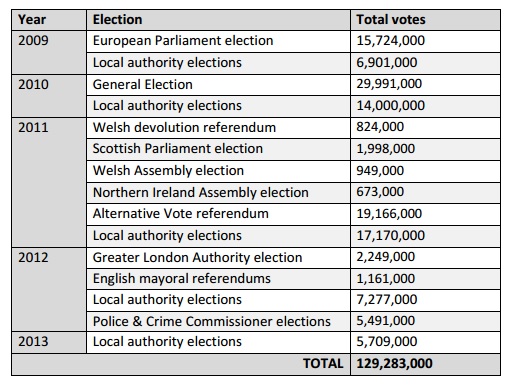
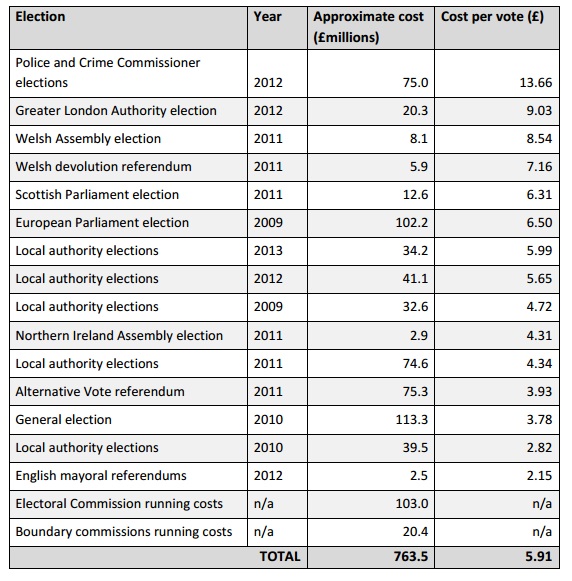
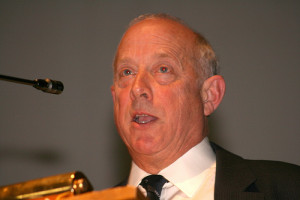

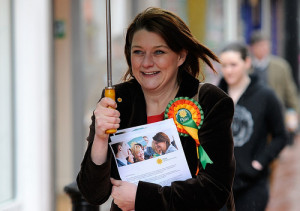
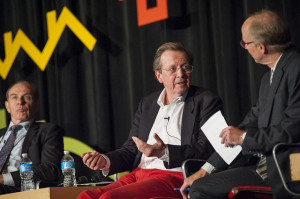




 Democratic Audit's core funding is provided by the Joseph Rowntree Charitable Trust. Additional funding is provided by the London School of Economics.
Democratic Audit's core funding is provided by the Joseph Rowntree Charitable Trust. Additional funding is provided by the London School of Economics.
Every vote cast in #UK elections costs the taxpayer £5.91. ( https://t.co/9pSHOwwxjf ) #democracy is an expensive stuff
The UK spends £150 million per year administering elections https://t.co/ctFq9fMZS6 via @democraticaudit (3 mil 200 millones de MX pesos)
How much do elections cost? @democraticaudit try to estimate https://t.co/upLfhEsPY3
Rolling Internet-Based Democracy
Democratic power and funding should be administered through rolling internet-based maintenance of political preferences in a single state-sponsored Voting System:
1. The Home Office should establish a single state-sponsored web-based Citizenship System and Citizenship Service; with Citizenship Data maintained in Citizenship Records in a single state-sponsored web-based Citizenship Database. Specifically:
a. There should be a Citizenship Record for each citizen ‘known to’ the state. The primary key to each citizen’s Citizenship Record should be that citizen’s NINO (National Insurance Number). Each citizen’s Citizenship Record should hold the definitive record of that citizen’s citizenship status, date of birth, name, family formation, and address.
b. The Citizenship Database should be populated initially by synchronised copy and merge of such data from the various state and local authority systems (e.g. such as the DWP and HMRC).
c. From then onwards, each citizen should maintain their Citizenship Data on a rolling basis. They should do so via personal computers, the internet and the single web-based Citizenship System; either directly by the citizen and/or through the single Citizenship Service. They should do so directly through their own personal computers, and/or (with support) through personal computers provided for public services in libraries, post offices, hospitals, schools, public offices and advice-charities such as the Citizens Advice Bureau.
d. From then onwards also, the DWP and HMRC systems (and all other state systems such as the Home Office, Voting, Passport, NHS, DVLC and Voting systems – see below) should use the Citizenship Database as the single definitive source of basic citizenship data.
2. The Home Office should establish a single state-sponsored web-based Voting System and Voting Service; with Voting Data maintained in Voting Records in a single state-sponsored web-based Voting Database. Specifically:
a. There should be a Voting Record for each citizen ‘known to’ the state. The primary key to each citizen’s Voting Record should be that citizen’s NINO (National Insurance Number). Each citizen’s Voting Record should hold the definitive record of that citizen’s voting history and entitlements.
b. The Voting Database should be populated initially by synchronised copy and merge of citizenship data from the single state-sponsored web-based Citizenship Database and voting data from the various existing voting systems.
c. Each citizen should maintain their political preferences in the Voting Data in their Voting Record on a rolling basis (i.e. not just at ‘election times’ and/or ‘referendum times’). They should do so via personal computers, the internet and a single web-based Voting System; either directly by the citizen and/or through a single Citizenship Service. They should do so directly through their own personal computers, and/or (with support) through personal computers provided for public services in libraries, post offices, hospitals, schools, public offices and advice-charities such as the Citizens Advice Bureau.
3. Political spending by Parties (on a rolling basis, for each referendum, and for each election) should be limited to state funding in proportion to popular support at that level (as registered in the Voting System on a rolling basis).
4. Voting rights at each level (i.e. global, super-state region, state, sub-state region, local, parish, etc.) should be limited to only those citizens who have registered preferences for a substantial recent period (perhaps one year) at that level (as registered in the Voting System on a rolling basis).
5. Parties should have the option to define ‘membership’ as those citizens who have supported that party for a substantial recent period (perhaps one year) at that level (as registered in the Voting System on a rolling basis).
6. Parties should have the option to limit involvement in development of policy and attendance at conferences to only those citizens who have supported that party for a substantial recent period (perhaps one year) at that level (as registered in the Voting System on a rolling basis).
7. Referendums and elections should be based on ‘snapshots’ of popular support (as registered in the Voting System as-of a cut-off date).
8. In order to provide focus on the remaining options in the lead-up to a referendum or election, less-popular options should be eliminated progressively (e.g. daily or weekly) until the winner could be declared.
9. Voting should not be ‘compulsory’. However, entitlement to state services such as the NHS and state education, state benefits and tax allowances should be contingent on constructive ‘engagement’ with civil society; through maintenance of political preferences in the Voting System (with a full range of ‘non-of-the-above’ options):
a. On a rolling basis (e.g. with a gap of at most perhaps 15 months).
b. In the lead-up to each relevant referendum and election (e.g. within at most perhaps 1 month before each relevant cut-off date).
Police & Crime Commissioner elections admin cost over £13 per vote https://t.co/3RmYJP3p4e h/t @francescrook https://t.co/33YhK5huaA
RT @francescrook: Every vote for the Police & Crime Commissioners cost almost £14, makes 18 century rotting boroughs look clean! https://t.c…
Here is @democraticaudit’s report: https://t.co/HyPRapOkhR
RT @richard3berry: 2012 PCC elections cost over 6 times as much per vote as the mayoral referendums in Bristol, Manc… https://t.co/zCbcsvHdXN
RT @MattCarterUK: Shows the #PCC elections to be truly excellent value for money… @democraticaudit
https://t.co/vOVdl6dOae https://t.co/xP…
The 2012 mayoral referendums had the lowest cost per vote of any major UK election of past five years https://t.co/kRUD6qCjeV
RT @democraticaudit: Find out how much each type of UK election costs per vote https://t.co/Nfmbf85Tf1. Key figures here: https://t.co/gnXOp7…
2012 PCC elections cost over 6 times as much per vote as the mayoral referendums in Bristol, Manchester, etc https://t.co/jkI3cDrVev
Handy table in new post by Democratic Audit’s @richard3berry looks at the different UK elex https://t.co/kKLwaKH3tD https://t.co/3w0K6kVOtH
UK spent £764 million on elections and referendums in the past five years https://t.co/14A8VL2wnJ
£764 million. That’s how much UK spent running elections over past five years. More or less. https://t.co/cQDVcY7s8F
The UK spends £150 million per year administering elections https://t.co/P22rqADQbc Richard Berry shows where the money goes.
The UK spends approximately £150 million per year administering elections https://t.co/ACepzvg0vG
Every vote cast in major UK elections costs the taxpayer £5.91 https://t.co/Tv9PnQHp3N
RT “@democraticaudit: Every vote cast in major UK elections costs the taxpayer £5.91 https://t.co/GsMBSPFbzv” #ModernStudies
Every vote cast in major UK elections costs the taxpayer £5.91 – my new analysis for @democraticaudit posted today https://t.co/PZLkmDbeXM
The UK spends approximately £150 million per year administering elections https://t.co/Y9qK0GaxQ3
.@USSU’s = bargain > RT @democraticaudit: The UK spends approximately £150 million per year administering elections https://t.co/S1ciJ2chvt